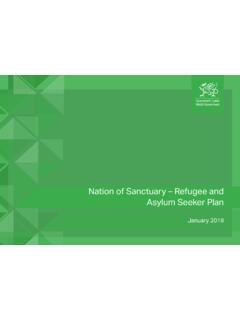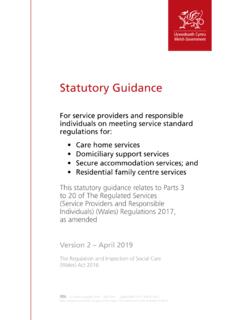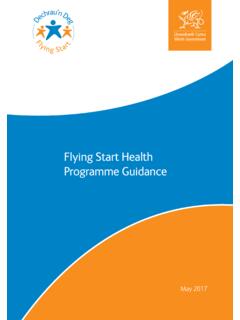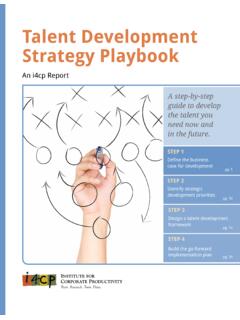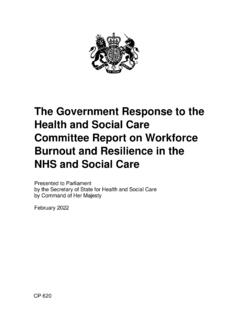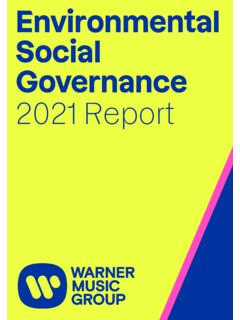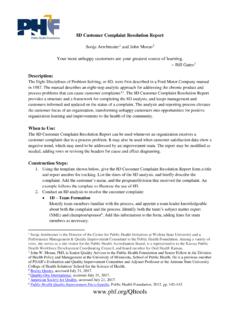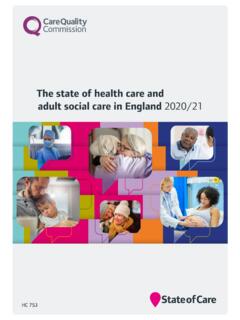Transcription of Review Health Social Care Report Final - GOV.WALES
1 The Parliamentary Review of Health and Social Care in WalesA Revolution from Within: Transforming Health and Care in WalesFinal ReportJanuary 2018 AcknowledgementsThe panel has benefitted from a wide range of views, including those from service users and staff working in, and leading, services, from many representative bodies, voluntary organisations and independent providers of care. Welsh Government officials provided information and advice. We are deeply grateful for the time and effort put into informing our work. We are also appreciative of the support and advice provided by the Political Reference project support team did a sterling job, which we greatly appreciate, in amassing evidence, engaging stakeholders and helping the panel to synthesise its deliberations. ContentsForeword 4 Introduction 6 High Level Recommendations 8 Recommendation 1: One Seamless System for Wales 10 Recommendation 2: The Quadruple Aim for All 12 Recommendation 3: Bold New Models of Seamless Care national principles local delivery 13 Recommendation 4: Put the People in Control 17 Recommendation 5: A Great Place to Work 19 Recommendation 6: A Health & Care System that s always learning 22 Recommendation 7: Harness Innovation, and Accelerate Technology and Infrastructure Developments 24 Recommendation 8: Align System Design to achieve results 27 Recommendation 9: Capacity to Transform, Dynamic Leadership, Unprecedented Cooperation 30 Recommendation 10.
2 Accountability, Progress & Pace 37 Conclusion 38 Annex A: Engagement undertaken during the Review 39 Annex B: Principles of Good Governance Annex C: Recommendation 7 Innovation, Technology and InfrastructureAnnex D: Terms of Reference of reviewAnnex E: References Crown copyright 2018 WG33336 Digital ISBN 978-1-78903-411-0 Mae r ddogfen yma hefyd ar gael yn document is also available in Welsh. 4 Chair s ForewordIf the case for change is compelling, then why hasn t it compelled?This year sees the 70th anniversary of the NHS; born in Wales, based on a model developed by the Tredegar Workmen s Medical Aid Society. The NHS continues to enjoy huge public support. However, in the 1940s, no one foresaw that the demand for Health and care would increase rather than diminish, due to changing needs, expectations and new forms of treatment and care. The key challenge is how public services might better anticipate and address new demands upon them effectively. This Parliamentary Review into Health and Social Care was established, on a cross-party basis, to advise on how this challenge might best be our Interim Report , we emphasised that the current pattern of Health and Social care provision is not fit for the future.
3 We presented this analysis as a case for change which showed the impact of a growing and changing pattern of need, expectations of services, and the challenge of securing a future workforce . We said those factors demand a new approach to maintain and improve the quality of Health and care. The current situation is of great concern for service users, Health and care organisations, Health and Social care workers, and society more broadly. Health and Social care services experience workforce shortages; Wales outcomes for Health and care are not improving as fast as desired; and service delivery is not consistently good. A risk-averse culture hampers change in the Health and care system, and limits efficient and effective decision funding, the long run picture is that spending on Health and care is outpacing the growth in the country s wealth a problem that many other developed economies also face. The pressure for additional investment in the NHS and Social care has already been set out in other reports.
4 Currently Health and care consume a growing proportion of the Welsh Government s budget, at the expense of other public service areas, for example education, housing and the arts, which also have a great influence on the Health and wellbeing of the people of Wales. A key aim therefore should be to maximise the value of care and by being more efficient to enable resources to be directed to the areas that have a bigger impact on Health and , our terms of reference did not include commenting on the level and sources of funding such as how to pay for Social care in the long-term. These remain key national issues. Our focus was on how to secure better outcomes. Whatever the overall envelope of funding, given current and future demands on the system, every pound spent must be more effective in improving outcomes for the users of services and for the people of Wales. Progress is underway, but it needs to be faster even to maintain levels of care. Chair s Foreword 5 The extensive engagement we undertook during the course of the Review is set out in the annex.
5 We very much appreciate the efforts of all those who gave their time so generously to speak and interact with us. Nobody we spoke to during the course of this Review disagreed with our assessment that the case for change is compelling. Decision makers across Wales and front-line staff dealing with these pressures on a daily basis share this perception. The recurrent question we have been asked is this: If the case for change is compelling, then why hasn t it compelled? Our answer is that there has neither sufficient clarity of vision to guide the system nor sufficient attention on the practical means of achieving that through such as citizen empowerment, leadership, governance, improvement, performance and finance. We aim to address this in our Final Report . This means whilst we aimed to produce a strategic Report , in some areas we have also gone into practical detail to guide implementation. The breadth of our work means that not every issue has been addressed, instead we have focused on the aspects where we think change is most needed.
6 Wales has the potential to overcome all of the challenges we have identified. The strong intent to improve Health and wellbeing is apparent, as is the desire for a high-quality NHS and Social care system. Wales legislation for sustainable development through the Wellbeing of Future Generations (Wales) Act, and the Social Services and Wellbeing (Wales) Act 2014, and the Welsh Government s new national strategy Prosperity for All sets a positive and forward-looking context that many other Health and care systems aspire to. The challenge is turning the ambition into the Welsh Government aims to steer the Health and care system into the next five years and beyond, our aim in this Report is to set out a way forward and to make recommendations on how change can be supported and explain, in practical terms, how to meet the challenges of the years ahead. Professor Sir Mansel Aylward CBProfessor Don Berwick Professor Dame Carol Black DBEDr Jennifer Dixon CBE Nigel EdwardsEric GregoryProfessor Keith MoultrieProfessor Anne Marie Rafferty CBEDr Ruth Hussey CB OBE (Chair)6 IntroductionOur Interim Report put the stark case that, in its current form, Wales Health and care system will need to change.
7 By a Health and care system, we mean the way care and support is delivered by public, independent and third sector bodies rather than their underpinning organisational towards this vision and the Quadruple Aim needs to be significantly accelerated. This will come about through the power of service users and communities to press for change, the ability of the workforce to test and learn what works and to accelerate change, new technology and innovation and the ability of leaders to take bold this Final Report , we recommend to the Welsh Government some key actions that need to be taken to do that, including: clarifying what a set of new models of care might look like; strengthening the power of citizens and users to make change; improving the local leadership and governance needed to implement change; harnessing digital, scientific, technological and infrastructure developments to underpin modernised models of care as well as unlock efficiencies; and at a national level designing the system to expedite and incentivise progress through increased transparency.
8 This will not be easy, nor is it a short-term task it is a significant test of leadership in Wales at a national, regional and local do acknowledge that healthcare and Social care in Wales were established as distinct sectors. Healthcare in Wales is almost entirely publicly funded and it is planned and commissioned by the NHS. Social care is publicly and privately funded and provided through multiple public, private and voluntary providers. Our recommendations assume these arrangements broadly continue in place but the focus should be on developing One system of seamless Health and care for Wales .Wales needs a different system of careWales is not alone in facing these challenges. The vision for care that Wales should achieve is one being pursued by most developed nations in the face of similar circumstances. This is to revolutionise care so that it empowers individuals to take decisions, tailors care to the individual s expressed needs and preferences, is far more proactive and preventative, is provided as close as possible to peoples homes, is seamless, and is of the highest quality.
9 Internationally, there is growing knowledge of what is needed to achieve this vision. Initially called the Triple Aim, a fourth dimension has been added due to a realisation that a key factor is the well-being and engagement of staff1. In our view this approach builds on values already developed in Wales and will help to give clear purpose and guide the vision into , we recommend that the vision should aim to deliver against four mutually supportive goals the Quadruple Aim each of which should be vigorously pursued. They are continually to:a. improve population Health and wellbeing through a focus on prevention;b. improve the experience and quality of care for individuals and families;c. enrich the wellbeing, capability and engagement of the Health and Social care workforce ; andd. increase the value achieved from funding of Health and care through improvement, innovation, use of best practice, and eliminating 7 Wales is a small country, but it has tremendous assets in its people, especially those who use, support and work in the Health and care system.
10 We met many who are innovating and progressing towards the vision we espouse, but they are sometimes doing so against the tide. Unless faster, more widespread progress can be unlocked, access to and the quality of services will decline in the face of the predictable pressures. The next five years will be a crucial test, which is why our Final recommendation is to Review progress against the vision and Quadruple Aim, alongside the rest of the UK and internationally, with open public debate as to the further action needed. 8 High Level RecommendationsRecommendation 1: One seamless system for WalesRapidly articulate a clear simple vision of what care will look like in the future to meet the needs of the population. Care should be organised around the individual and their family as close to home as possible, be preventative with easy access and of high quality, in part enabled via digital technology, delivering what users and the wider public say really matters to them. Care and support should be seamless, without artificial barriers between physical and mental Health , primary and secondary care, or Health and Social care.



